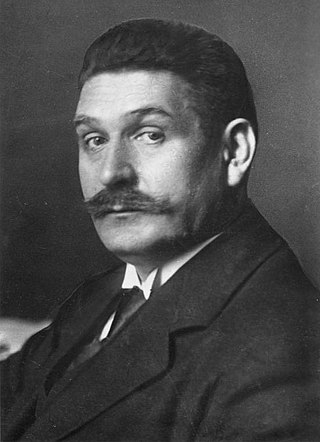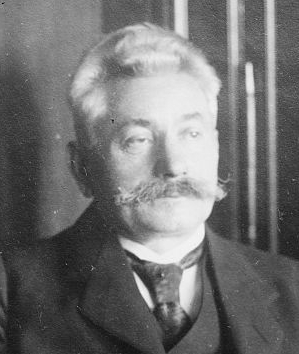Related Research Articles

Gustav Adolf Bauer was a German Social Democratic Party leader and the chancellor of Germany from June 1919 to March 1920. Prior to that, he was minister of labour in the last cabinet of the German Empire and during most of the German Revolution that preceded the formal establishment of the Weimar Republic.

The German Trade Union Confederation is an umbrella organisation for eight German trade unions, in total representing more than 6 million people. It was founded in Munich, 12 October 1949.
Trade unions in Germany have a history reaching back to the German revolution in 1848, and still play an important role in the German economy and society.

Anke Fuchs was a German lawyer and politician of the Social Democratic Party of Germany. She was Federal Minister for Youth, Family and Health (1982) and Vice President of the Bundestag (1998–2002). From 2003 until 2010, she was the president of the Friedrich Ebert Foundation.

Rudolf Wissell was a German politician in the Social Democratic Party of Germany (SPD). During the Weimar Republic, he held office as the Minister for Economic Affairs and Minister for Labour.

Carl Legien was a German unionist, moderate Social Democratic politician and first President of the International Federation of Trade Unions.
The General German Trade Union Federation was a confederation of German trade unions in Germany founded during the Weimar Republic. It was founded in 1919 and was initially powerful enough to organize a general strike in 1920 against a right-wing coup d'état. After the 1929 Wall Street crash, the ensuing global financial crisis caused widespread unemployment. The ADGB suffered a dramatic loss of membership, both from unemployment and political squabbles. By the time the Nazis seized control of the government, the ADGB's leadership had distanced itself from the Social Democratic Party of Germany (SPD) and was openly cooperating with Nazis in an attempt to keep the organization alive. Nonetheless, on May 2, 1933, the SA and SS stormed the offices of the ADGB and its member trade unions, seized their assets and arrested their leaders, crushing the organization.

The German Metal Workers' Union was a German industrial union for metalworkers formed in 1891 and dissolved after the Nazis' accession to power in 1933.
Werner Hansen was a German Social democratic politician and trades unionist. After 1933 he stayed in Germany for several years undertaking illegal resistance work, and emigrating only in 1937. He was able to return and resume his trades union career in 1945.

The Majority Social Democratic Party of Germany was the name officially used by the Social Democratic Party of Germany (SPD) between April 1917 and September 1922. The name differentiated it from the Independent Social Democratic Party, which split from the SPD as a result of the party majority's support of the government during the First World War.
The German Leather Workers' Union was a trade union representing workers involved in tanning and glovemaking.
Albin Mohs was a German trade union leader.
Georg Schmidt was a German trade unionist and politician.

The German Furriers' Union was a trade union representing fur workers in Germany.
The Union of Domestic Workers of Germany was a trade union representing domestic staff in Germany.
The Union of Stone Setters, Pavers and Kindred Trades was a trade union representing paviours and people in related trades, in Germany.
The International Artists' Lodge is a trade union section and former independent trade union, representing variety and circus performers in Germany.

The Central Union of Employees was a trade union representing white collar, private sector workers in Germany.
Albert Regge was a German trade union leader.
The Central Union of Potters was a trade union representing pottery workers in Germany.
References
- 1 2 3 Mommsen, Wolfgang; Husung, Hans-Gerhard (2017). The Development of Trade Unionism in Great Britain and Germany, 1880-1914. Taylor & Francis. ISBN 1351815253.
- 1 2 3 "Auf dem Weg zur Massenorganisation". Geschichte der Gewerkschaften. Retrieved 30 June 2020.
- 1 2 3 "Aufgaben der Generalkommission". Geschichte der Gewerkschaften. Retrieved 30 June 2020.
- 1 2 "Endlich gelingt der Durchbruch". Geschichte der Gewerkschaft. Retrieved 30 June 2020.
- ↑ "Debatte über Massenstreik". Geschichte der Gewerkschaften. Retrieved 30 June 2020.
- ↑ "Ja zur Kriegspolitik des Kaisers". Geschichte der Gewerkschaften. Retrieved 30 June 2020.
- 1 2 "Viele Zerreißproben". Geschichte der Gewerkschaften. Retrieved 30 June 2020.
- ↑ "Ausgabe Adressen Beilage" (PDF). Gewerkschaftspresse: 1. 5 April 1919. Retrieved 4 June 2020.
- ↑ Brunner, Louis (1905). Die Deutschen Gewertschaften 1891-1904 (PDF). Berlin: General Commission of German Trade Unions. p. 9. Retrieved 16 June 2020.
- ↑ Seidel, Richard. "DER WEG ZUR INDUSTRIEGEWERKSCHAFT" (PDF). Friedrich Ebert Stiftung. Retrieved 17 June 2020.
- ↑ Kwasnik, Walter. "Deutscher Landarbeiter-Verband". Friedrich Ebert Stiftung. Retrieved 28 May 2020.
- ↑ Figure is for 1914: "Etzkorn, Friedrich (1874-1946)". Friedrich Ebert Stiftung. Retrieved 3 June 2020.
- ↑ Figure is for 1914: Urban, Otto (1931). Zentralverband der Angestellten. ADGB. p. 2101–2106. Retrieved 19 June 2020.